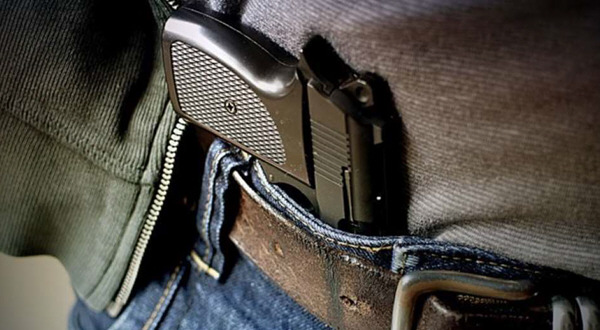

Does Concealed-Carry
Reciprocity Have a Chance?

(NRA)
By Susanne Edward. April 20, 2025
Article Source
For millions of law-abiding gun owners across the United States, the right to self-defense should not stop at the state line. Yet, thanks to a patchwork of conflicting state laws, those who hold concealed-carry permits in their home states can find themselves at odds with the law simply by traveling to another part of the country.
That's the reality Rep. Richard Hudson (R-N.C.) hopes to change with the reintroduction of the Constitutional Concealed Carry Reciprocity Act (H.R. 38).
Hudson's bill, which recently passed through the House Judiciary Committee on an 18-9 vote, seeks to streamline national gun laws by requiring states to recognize each other's concealed-carry permits—as they do with driver's licenses. While the concept is simple, the implications are profound, and the bill's momentum has once again brought the debate over national reciprocity to the forefront of American politics.
A Matter of Common Sense
"It's a very common sense, simple piece of legislation," Hudson explained in an appearance on Fox News's America Reports. "It says that every state should recognize the concealed-carry permissions of the other states."
Supporters argue that national reciprocity is not a matter of expanding gun rights but instead is about protecting responsible gun owners from becoming criminals due to legal inconsistencies. As it stands, individuals who are permitted to carry in their home states can face arrest or prosecution in others—simply because local laws vary wildly. Hudson and fellow supporters see this as a gross violation of our Second Amendment-protected rights.
"When law-abiding citizens are traveling, they shouldn't be turned into criminals because they cross the state line," said Hudson.
That sentiment has also been echoed by President Donald Trump (R). "Your Second Amendment does not end at the state line," Trump said in a 2024 campaign video. "I will sign concealed carry reciprocity."
A Patchwork of Permits
Currently, many states do recognize other states' concealed-carry permits, but it is a complicated patchwork; many, however, either limit recognition to a list of other states or reject all out-of-state permits entirely. This legal minefield makes it almost impossible for gun owners to travel with confidence, especially given the lack of uniformity in requirements.
That complexity is what national reciprocity aims to resolve. Under the proposed law, any individual who is lawfully permitted to carry a concealed firearm in their home state would be allowed to carry in any other state that permits concealed carry. Importantly, this bill does not create a federal permitting system, nor does it prevent states from setting their own standards for issuing permits—it simply requires them to recognize permits issued by other states.
Opposition and Roadblocks
'Gun-control' advocates and many Democrat lawmakers have pushed back, characterizing the bill as an erosion of states' rights. Anti-gun organizations like Everytown for Gun Safety argue that national reciprocity could allow individuals with permits from lenient states to carry concealed in stricter jurisdictions, thereby bypassing more rigorous requirements.
"Gutting state gun laws just makes it easier for dangerous people to carry a hidden weapon with no training, with no questions asked," said Monisha Henley, Everytown's senior vice president of government affairs.
Critics also worry that the law would make it harder for law enforcement to verify whether someone is legally permitted to carry.
In response, proponents point out that the bill does not authorize concealed carry for individuals prohibited by federal or state law. It creates consistency in the legal recognition of permits. In other words, it protects the rights of law-abiding citizens without offering a free pass to those who can't legally have a firearm in the first place.
Political Reality: A Senate Hurdle
Despite passing the House in 2017, a prior version of this bill died in the U.S. Senate, where the filibuster's 60-vote threshold presents a serious obstacle. That challenge remains today. Sen. John Thune (R-S.D.), a long-time supporter of the bill, has vowed to push it through, but achieving the necessary votes will likely require bipartisan support.
Still, there is reason for optimism. With President Trump reiterating his support and a growing coalition of lawmakers backing the measure, national reciprocity remains a priority.
"We got it through the Judiciary Committee, we got it through the House," said Hudson. "The Senate wouldn't move it. But I think we'll get it done this time."
For concealed-carry permit holders, national reciprocity isn't just a political issue; it's a practical safeguard. The Second Amendment affirms the right to bear arms, however, a maze of conflicting state laws creates confusion and legal risk for law-abiding citizens. Reciprocity would bring consistency, ensuring that this constitutional right is protected across state lines.
![]()
























